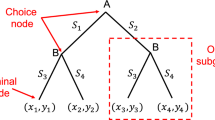Abstract
In this paper, we propose a game-theoretic model of security for quantum key distribution (QKD) protocols. QKD protocols allow two parties to agree on a shared secret key, secure against an adversary bounded only by the laws of physics (as opposed to classical key distribution protocols which, by necessity, require computational assumptions to be placed on the power of an adversary). We investigate a novel framework of security using game theory where all participants (including the adversary) are rational. We will show that, in this framework, certain impossibility results for QKD in the standard adversarial model of security still remain true here. However, we will also show that improved key-rate efficiency is possible in our game-theoretic security model.
Access this chapter
Tax calculation will be finalised at checkout
Purchases are for personal use only
Similar content being viewed by others
References
Scarani, V., Bechmann-Pasquinucci, H., Cerf, N.J., Dušek, M., Lütkenhaus, N., Peev, M.: The security of practical quantum key distribution. Rev. Mod. Phys. 81, 1301–1350 (2009)
Katz, J.: Bridging game theory and cryptography: recent results and future directions. In: Canetti, R. (ed.) TCC 2008. LNCS, vol. 4948, pp. 251–272. Springer, Heidelberg (2008). https://doi.org/10.1007/978-3-540-78524-8_15
Miao, F., Zhu, Q., Pajic, M., Pappas, G.J.: A hybrid stochastic game for secure control of cyber-physical systems. Automatica 93, 55–63 (2018)
Zhu, Q., Basar, T.: Game-theoretic methods for robustness, security, and resilience of cyberphysical control systems: games-in-games principle for optimal cross-layer resilient control systems. IEEE Control Syst. 35(1), 46–65 (2015)
Manshaei, M., Zhu, Q., Alpcan, T., Basar, T., Hubaux, J.: Game theory meets network security and privacy. ACM Comput. Surv. 45(3), 25:1–25:39 (2013)
Zhu, M., Martinez, S.: Stackelberg-game analysis of correlated attacks in cyber-physical systems. In: American Control Conference, ACC, pp. 4063–4068, June 2011
Maitra, A., De, S.J., Paul, G., Pal, A.K.: Proposal for quantum rational secret sharing. Phys. Rev. A 92(2), 022305 (2015)
Dou, Z., Xu, G., Chen, X.B., Liu, X., Yang, Y.X.: A secure rational quantum state sharing protocol. Sci. China Inf. Sci. 61(2), 022501 (2018)
Zhou, L., Sun, X., Su, C., Liu, Z., Choo, K.K.R.: Game theoretic security of quantum bit commitment. Inf. Sci. (2018)
Maitra, A., Paul, G., Pal, A.K.: Millionaires problem with rational players: a unified approach in classical and quantum paradigms. arXiv preprint (2015)
Qin, H., Tang, W.K., Tso, R.: Establishing rational networking using the DL04 quantum secure direct communication protocol. Quantum Inf. Process. 17(6), 152 (2018)
Das, B., Roy, U., et al.: Cooperative quantum key distribution for cooperative service-message passing in vehicular ad hoc networks. Int. J. Comput. Appl. 102, 37–42 (2014). ISSN 0975 8887
Houshmand, M., Houshmand, M., Mashhadi, H.R.: Game theory based view to the quantum key distribution BB84 protocol. In: 2010 Third International Symposium on Intelligent Information Technology and Security Informatics, IITSI, pp. 332–336. IEEE (2010)
Kaur, H., Kumar, A.: Game-theoretic perspective of Ping-Pong protocol. Phys. A: Stat. Mech. Appl. 490, 1415–1422 (2018)
Boström, K., Felbinger, T.: Deterministic secure direct communication using entanglement. Phys. Rev. Lett. 89(18), 187902 (2002)
Lucamarini, M., Mancini, S.: Secure deterministic communication without entanglement. Phys. Rev. Lett. 94(14), 140501 (2005)
Nielsen, M., Chuang, I.: Quantum Computation and Quantum Information. Cambridge University Press, Cambridge (2000)
Bennett, C.H., Brassard, G.: Quantum cryptography: public key distribution and coin tossing. In: Proceedings of IEEE International Conference on Computers, Systems and Signal Processing, New York, vol. 175 (1984)
Bennett, C.H.: Quantum cryptography using any two nonorthogonal states. Phys. Rev. Lett. 68, 3121–3124 (1992)
Renner, R., Gisin, N., Kraus, B.: Information-theoretic security proof for quantum-key-distribution protocols. Phys. Rev. A 72, 012332 (2005)
Shor, P.W., Preskill, J.: Simple proof of security of the BB84 quantum key distribution protocol. Phys. Rev. Lett. 85, 441–444 (2000)
Csiszár, I., Korner, J.: Broadcast channels with confidential messages. IEEE Trans. Inf. Theory 24(3), 339–348 (1978)
Krawec, W.O.: Quantum key distribution with mismatched measurements over arbitrary channels. Quantum Inf. Comput. 17(3), 209–241 (2017)
Phoenix, S.J., Barnett, S.M., Townsend, P.D., Blow, K.: Multi-user quantum cryptography on optical networks. J. Mod. Opt. 42(6), 1155–1163 (1995)
Author information
Authors and Affiliations
Corresponding author
Editor information
Editors and Affiliations
Rights and permissions
Copyright information
© 2018 Springer Nature Switzerland AG
About this paper
Cite this paper
Krawec, W.O., Miao, F. (2018). Game Theoretic Security Framework for Quantum Key Distribution. In: Bushnell, L., Poovendran, R., Başar, T. (eds) Decision and Game Theory for Security. GameSec 2018. Lecture Notes in Computer Science(), vol 11199. Springer, Cham. https://doi.org/10.1007/978-3-030-01554-1_3
Download citation
DOI: https://doi.org/10.1007/978-3-030-01554-1_3
Published:
Publisher Name: Springer, Cham
Print ISBN: 978-3-030-01553-4
Online ISBN: 978-3-030-01554-1
eBook Packages: Computer ScienceComputer Science (R0)




